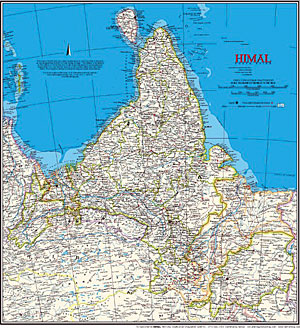 |
Each of India's neighbours is culturally different and each has a unique historical trajectory with Delhi, which means one size can't fit all. But there are two threads that run through India's bilateral ties with each neighbour: democracy and trade.
Democractic governments must be encouraged because India is the largest democracy in the world. This is not to say that Delhi won't deal with dictatorships. It was during General Musharraf's tenure that several long-pending issues were realised, and talks on that ever-elusive subject called Kashmir were significantly advanced. Delhi will also use trade and commerce as key instruments of its foreign policy, not least because the colour of money has little or no ideology.
Change is coming to both Delhi and Kathmandu this month. The deadline for Nepal's new constitution is not expected to be met, and India's new ambassador to Nepal, Jayant Prasad, arrives in Kathmandu a week or so before 31 August. Meanwhile, Akhilesh Mishra, newly returned from Kathmandu, is set to take over as joint secretary in charge of Nepal (and Bhutan) in the Ministry of External Affairs.
Short of second-guessing what Jayant Prasad is going to do, always a dangerous game for out-of-town columnists, the truth is that Delhi is keen that Nepal resolves its internal political crisis sooner than later. This is the message Home Minister P Chidambaram had for a delegation of Nepali editors in town last week. He said India would not seal the border because there was too much at stake for both sides.
The crux of the new strategy: India has a stake in the improvement of its periphery and it will do everything it can to take its neighbours along on its own path of economic growth. Equally, neighbourhood democracies must meet Delhi half-way.
Bangladesh is a case in point. The Indian prime minister is all set to unveil dramatic new breakthroughs in border management when he goes to Dhaka in early September. Pakistan is being wooed by the promise of greater economic growth as a function of open trade with a Most Favoured Nation trading status, except Islamabad wants to call it "non-discriminatory trade". Delhi says it doesn't care what it is called, as long as it's done.
Do these models have a lesson for the India-Nepal relationship? Yes. With an open border and an open trading system, Kathmandu and Delhi can do so much more for their own peoples.
Read also:
"China hopes for social stability"
The new Chinese ambassador to Nepal, Yang Houlan, spoke to Nepali Times this week on his country's priorities in bilateral ties with Nepal, Sino-Indian relations and the plans to develop Lumbini.



